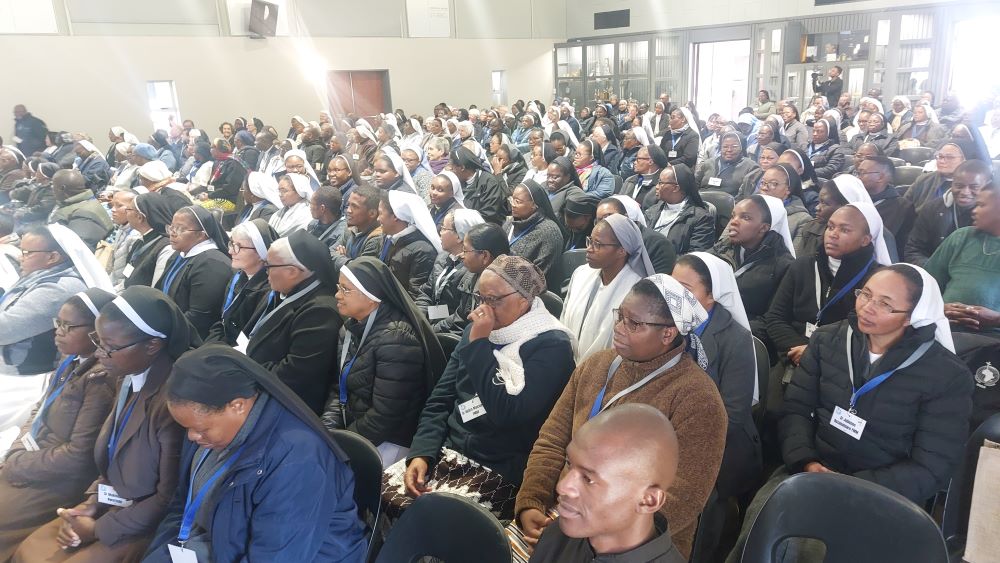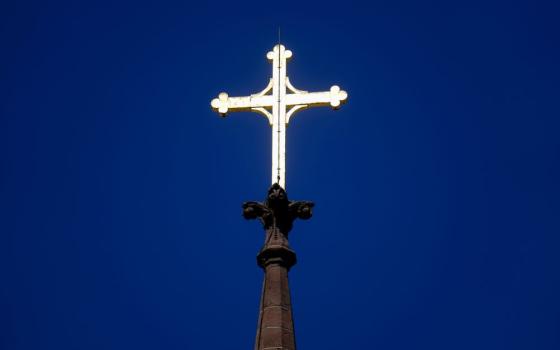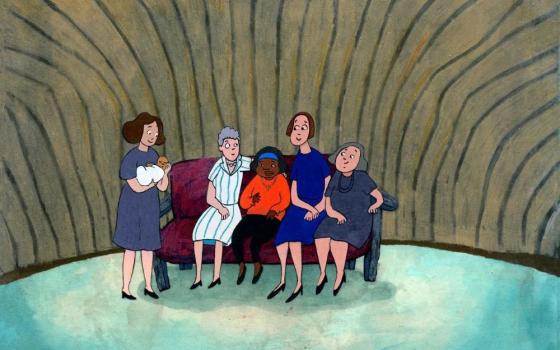
Religious leaders, including Catholic sisters, attend the symposium and sixth annual general meeting of the Conference of Major Superiors of Africa and Madagascar, held in Johannesburg and Pretoria May 23-30. (Courtesy of LCCLSA)
As the Catholic Church continues to reflect on the idea of synodality — walking and working together as a community — religious leaders from across Africa are putting this vision into action. Hundreds of leaders from religious congregations, including many women, gathered in South Africa for a weeklong event focused on hope, unity and the future of consecrated life on the continent.
The 2025 Symposium and Sixth Annual General Meeting of the Conference of Major Superiors of Africa and Madagascar, or COMSAM, is taking place in Johannesburg and Pretoria May 23-30. The theme is "Hope, Synodality and the Empowerment of Consecrated Life in Africa."
The symposium was held at St. Dominic's Catholic School for Girls in Boksburg, Johannesburg, May 23-25; the general meeting is being hosted at St. John Maria Vianney Seminary in Pretoria May 26-30. Participants have come from all six regions of Africa and Madagascar, representing many congregations and ministries.
"This is more than just a meeting," said Sr. Jane Waruguru Kimathi, director of programs at the Pan-African Catholic Theology and Pastoral Network. "It shows how serious we are about walking together in the church, just as Pope Francis encourages us to do."
Synodality, she said, "is not just a Vatican slogan — it is how we live. Consecrated life in Africa continues to show the spirit of walking together. Our African culture is naturally synodal. We must keep this value alive. Through dialogue and sharing, we can grow and do better."
The general meeting is led by Sr. Marie Diouf, COMSAM president and a member of the Daughters of the Immaculate Heart of Mary in Senegal. In an interview with Global Sisters Report, she said it is time for the African church to be more independent.
"We have come to see that the church in Africa must take control of its future and work toward independence," she said. "This independence is now essential. Africa must continue preaching the Gospel, but by leading its own path. The church and religious life in Africa must be examples of peace — and peace cannot exist without real development."
One high-profile guest is Sr. Simona Brambilla, the newly appointed head of the Vatican Dicastery for Institutes of Consecrated Life and Societies of Apostolic Life. She is the first woman to lead a Vatican dicastery. Instead of giving a formal speech, she chose to spend time with the participants, listening and speaking with them personally.
'Our African culture is naturally synodal. We must keep this value alive.'
—Sr. Jane Waruguru Kimathi
Among topics under discussion are how to support one another across congregations, train new leaders, help young people grow and promote peace and care for the environment. They are also sharing ways to deal with global challenges like sexual abuse, migration and poverty.
The event includes workshops and panels with leaders from over 40 African countries. It is organized by COMSAM with the Leadership Conference of Consecrated Life South Africa, chaired by Sr. Zelna Oosthuizen, and supported by the South African Catholic Bishops' Conference, Symposium of Episcopal Conferences of Africa and Madagascar, Missio, the Catholic Women's League and the Conrad N. Hilton Foundation, a major funder of Global Sisters Report.
The symposium also gives participants a chance to talk about shared challenges in Africa, like forced migration, religious violence and climate change. Religious communities are finding ways to work together across borders, share resources and support communities in need.
In his speech to the group, Cardinal Fridolin Ambongo Besungu said the African church is already prepared for synodality because of African traditions like ubuntu and community gatherings under the "palaver tree."
Amongo Besungu, archbishop of Kinshasa, Democratic Republic of Congo, and president of the South African Catholic Bishops' Conference, was considered a possible successor to Pope Francis.
"Religious life in Africa must continue to be a place where synodality is lived," Amongo Besungu said. "Our cultures already teach us to live this way. 'Ubuntu' means, 'I am because we are.' "
Advertisement
For many sisters, the event is a moment of encouragement and renewal.
"This symposium reminds us that we are not alone," said Sr. Grace Kyomugisha, president of the Association of Consecrated Women in Eastern and Central Africa. "It has given sisters the chance to talk openly with bishops, priests, laypeople and each other. That is a sign of hope, thanks to the space created by the synod on synodality."
The meeting will end May 30 with a shared commitment to continue building a future of unity and service in Africa.
"Consecrated life in Africa faces the challenge of communion," said one of the final statements. "We must break out of our isolation and embrace a continental consecrated life. We cannot face the future in disarray. The future lies in synodality — in walking together and working together to build the future of our societies."
The leaders said they would continue listening to the voices of the poor, supporting education that cares for both people and the environment, and guiding the younger generation.
"We must stay close to the people, especially the young," the statement said. "We need to show them the way and be true signs of hope."





